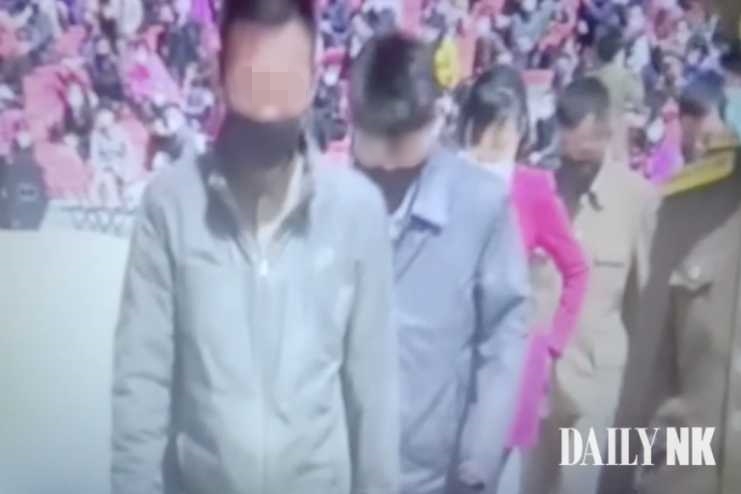 FILE PHOTO: A clip from a video showing North Koreans being called up to face a public criticism in March 2023. (Daily NK)
FILE PHOTO: A clip from a video showing North Koreans being called up to face a public criticism in March 2023. (Daily NK)North Korean authorities are doing everything they can to stop the spread of South Korean pop culture, or hallyu, but young people keep using South Korean expressions and speech patterns anyway.
Article 41 of North Korea’s Youth Education Guarantee Act, passed in 2021, forbids young people from speaking or writing “in odd speech patterns that are not our own.” While North Korea has legally banned youth from using “non-socialist” language, South Korean speech patterns are quietly spreading among young people regardless.
According to a Daily NK source in North Hamgyong province recently, four people in their twenties were arrested in Chongjin by local state security officers for talking like South Koreans. A local resident had tipped off authorities after spotting the group mimicking lines from South Korean films and dramas.
The four are currently being questioned at the city’s Ministry of State Security branch and will likely face six months to a year of forced labor.
“These days, young people are careful to avoid South Korean speech during official activities because they know about the crackdowns, but when they’re with friends, they use it without hesitation—mimicking lines from South Korean movies and shows,” the source said. “They copy the patterns quite naturally, probably because they’ve grown up watching this content.”
When young people hang out together, they freely use South Korean expressions like jagiya (honey), oppa (elder brother, used affectionately by women), daebak (awesome), and jjokpallinda (embarrassed).
This might be their way of mocking North Korean society, where constant surveillance and informing on each other have become normal. North Korean youth embrace South Korean speech patterns, adapting what they hear in films and dramas while laughing and smiling as they do it, the source explained.
Parents’ growing fears
“Places up north like the Hamgyong provinces and Ryanggang province have thick accents, so many North Koreans admire the Pyongyang accent. But South Korean accents sound much softer and friendlier than Pyongyang’s, so everyone tries to copy them sometimes,” the source said. “Young people are especially drawn to and curious about how South Koreans speak.”
Given this reality, completely eliminating the South Korean speech patterns now common among youth will be nearly impossible.
Parents watching how their children talk can’t hide their anxiety and worry.
“Young people today are too careless. No matter how friendly a gathering seems, you never know when someone will report you to the Ministry of State Security—as they say, walls have ears,” said a Chongjin resident in their forties.
“As someone with a child in their twenties, I’m constantly on edge,” said a resident of Hoeryong in their fifties. “Seeing kids my child’s age get dragged into the Ministry of State Security for questioning just for speaking like South Koreans terrifies me.”
“Sometimes my child copies lines from South Korean movies, and while it makes me laugh at first, I end up scolding them because I’m worried they’ll get caught doing it outside. But my child just shrugs it off, saying it’s no big deal, that it’s fine,” they continued with a sigh. “It’s already exhausting worrying about how to feed my family, but now I have to worry about this too. It’s really tough.”
